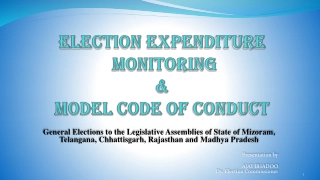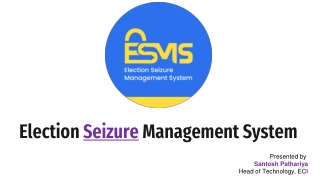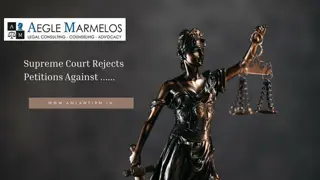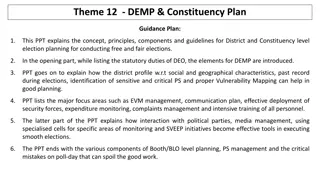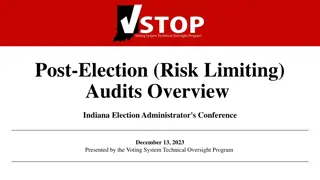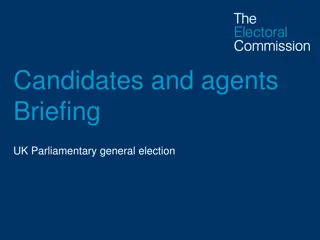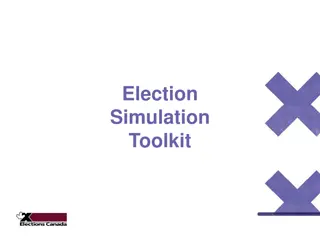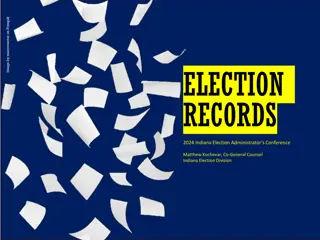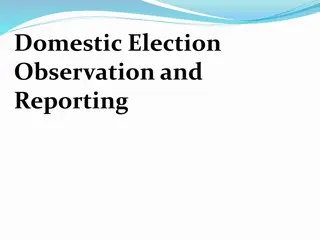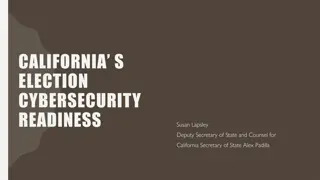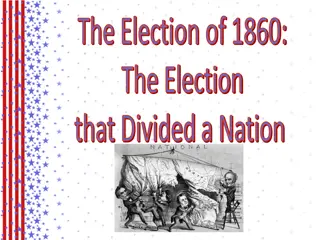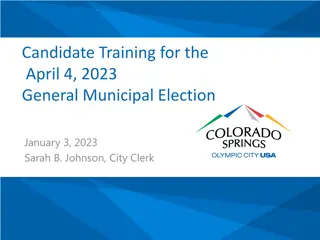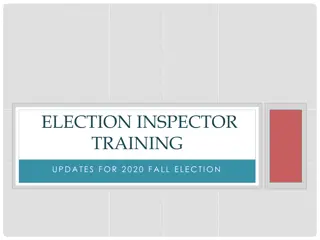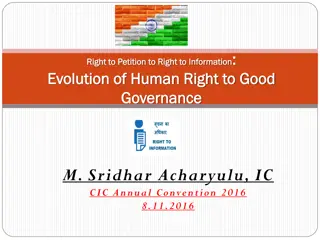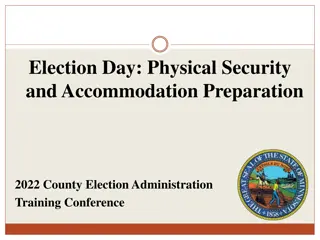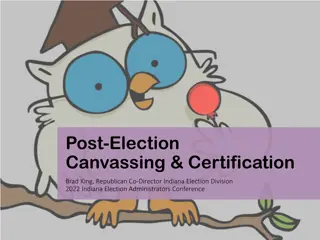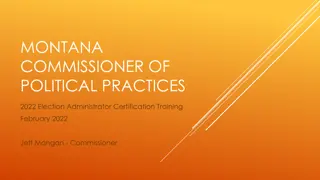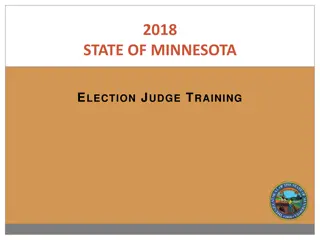
Understanding Election Petitions and Jurisdiction in Nigeria
Explore the detailed process, laws, and courts involved in election petitions in Nigeria, including the Electoral Act, Constitutional provisions, Court of Appeal jurisdiction, and National and State House of Assembly Election Tribunals. Learn about the specific procedures and regulations governing election disputes and the relevant legal frameworks to address challenges related to the validity of elections and candidate returns.
Uploaded on | 1 Views
Download Presentation

Please find below an Image/Link to download the presentation.
The content on the website is provided AS IS for your information and personal use only. It may not be sold, licensed, or shared on other websites without obtaining consent from the author. If you encounter any issues during the download, it is possible that the publisher has removed the file from their server.
You are allowed to download the files provided on this website for personal or commercial use, subject to the condition that they are used lawfully. All files are the property of their respective owners.
The content on the website is provided AS IS for your information and personal use only. It may not be sold, licensed, or shared on other websites without obtaining consent from the author.
E N D
Presentation Transcript
An proceeding where actions instituted for the purposes of challenging the validity of an election or disputing the due return of a candidate or claiming the return of a candidate are commenced by petition We shall, therefore, practice and procedure settling of election disputes election petition is a special consider relating the to
APPLICABLE LAWS Electoral Act, No.6, 2010, as amended It governs all election petitions in Nigeria except elections in States Each State (not FCT) has its own Electoral Law that regulates local govt elections local government
Constitution of the Federal Republic of Nigeria (as amended) Rules and Regulations made under the Act S. 145 (1) & (2) Electoral Act 2010, Rules of Procedure for Election Petitions (See Para 54 &55 of 1stSchedule to the Act) Electition Petition and Court Practice Directions, 2011 Federal High Court (Civil Procedure) Rules
COURT OF APPEAL Has exclusive and original jurisdiction in respect of the following matters: Any question as to whether any person has been validly elected to the office of President or Vice President Whether the term of office of such a person has ceased Whether the office has become vacant S. 239(1) 1999 Const.
Composition 3 Justices of the Court of Appeal Appeal Appeal from the Court of Appeal in respect of this matters goes to the Supreme Court as of Right See S.233 (2) (e)
NATIONAL AND STATE HOUSE OF ASSEMBLY ELECTION TRIBUNALS See S.285 (1) of the 1999 Const. (as amended) Have original jurisdiction to hear and determine petitions as to whether Any person has been validly elected as a member of the National Assembly or Any person has been validly elected as a member of the House of Assembly of a State
See S. 251 (4) Amended Constitution which confers jurisdiction on the Federal High Court To determine any question as to whether the term of office or a seat of a member of the Senate or the House of Representatives has ceased or his seat has become vacant Also S. 272 (3) Amended Constitution vests jurisdiction in the Federal High Court to hear and determine whether the term of office of a member of the House of Assembly of a State, a Governor or Deputy Governor has ceased or become vacant
COMPOSITION OF NATIONAL AND STATE HOUSE OF ASSEMBLY ELECTION TRIBUNAL Chairman who shall be a judge of a high court 2 members appointed from the judiciary and not below Magistrate Appointment done by President of CA in consultation with the CJ of the State, Grand Kadi SCA of the State or President of the CCA of the State See 6thSchedule to the Constitution(as amended) the rank of Chief
Quorum Chairman and 1 other member S.285 (4) as amended Appeal Appeal from National and State House of Ass. Election Tribunal goes to the Court of Appeal By virtue of S. 246 (3) Const. the decision of the Court of Appeal is final with respect to the above NOTE: Appeal from Governorship Election Tribunal has been taken out For Governorship Supreme Court it goes upward to
THE GOVERNORSHIP ELECTION TRIBUNAL S. (2nd 285 (2) Const. as amended Alteration Act) Established Federation and vested with jurisdiction to determine petitions as to whether Any person has been validly elected to the office of Governor or Governor of a State in each State of the Deputy
Composition Chairman + 2 members Quorum Chairman + 1 member Appeal To CA as of right S. 246 (1) (c) Further appeals goes to the Supreme Court S. 233 (2) (e)
AREA COUNCIL ELECTION TRIBUNAL FOR FCT The various States have their electoral laws to regulate local govt elections in their State but the one for the FCT is provided for in the Electoral Act 2010 For FCT, established by S. 135 (1) of the Act Composition Chairman + 2 members S. 135 (2)
Qualification Chairman Chief Magistrate Other mbrs practitioners of atleast 10 years post-call experience S. 135 (3) Act Appeal Goes to Area Council Tribunal Decision is final Chairman + 2 mbrs Quorum chairman + 1 mbr s. 136 (4) magistrate or legal Election Appeal
NOTE An election tribunal is only given exclusive power to hear and determine election petitions and its power does not extend to the intra party dispute that takes place before elections e.g. pre-election matters such as conduct and outcome of primaries of a political party See Duokpolagha v. George (1992) 4 NWLR (pt 236) 444 The election tribunal must be constituted not later than 14 days before the election S. 133 (3) Electoral Act
PRESENTATION OF ELECTION PETITION
Who may present a petition? PETITIONER presents the instance it is presented S. 137 (1) Electoral Act 2010 provides that the following persons may present a petition A candidate in an election A political party which participated in the election Only the above can present election petition Egolum v. Obasanjo(1999) 7 NWLR (pt 611) 355 is the person or who whose petition at
Note the following interpretation A person who was neither a candidate at an election nor a member of a political party nor sponsored by a political party to contest the election and who did not specify the nature of his right to present the petition was held incompetent to present a petition. Egolum v. Obasanjo A person who failed to secure the nomination of his party but claim to have been wrongly excluded is incompetent to present an election petition (i.e. intra party dispute) NEC v. NRC (1993) 1 NWLR (600) 549; Anazodo v. Audu (1999) 4 NWLR (pt 600) 549
A person who was properly nominated by his party but was unlawfully excluded by the electoral commission from contesting the election is competent to present a petition Ojo v. Abogunrin (1989) 5 NWLR (pt 120) 162 A political party that failed to present a candidate for election is incompetent to present a petition. Egolum v. Obasanjo But a candidate that contested and lost the election may bring a petition. Nnamani v. Nnaji (1999) 7 NWLR (pt 610) 313
RESPONDENT is a person whose election is complained of, that is, the successful party at the election S. 137 (2) Electoral Act *a person who lost an election is the petitioner *can a person who lost an election sue the person who won + another person who lost as a respondent?
No, a candidate who contested and lost cannot be made a respondent Buhari v. Yusuf (2003) 14NWLR (pt 841) 446 S.137 (3) provides that INEC can also be a respondent Where the petitioner complains about the conduct of an electoral (whether presiding or returning) officer necessary to join notwithstanding the complaint. INEC shall be made a respondent and will be deemed to be defending the petition for itself and on behalf of its officers it shall such nature not officers of be the
Time for presenting Petition 21 days after the date of the declaration of the result of the elections See s. 285 (5) of the Const. as amended (s. 134 Elect. Act has been deleted from the Act. Electoral (Amendment) Act, 2010) See Malah v. Kachallah (1999) 6 NWLR (pt 606) p. 283 at 290 See Section 32
Grounds for the petition See s. 138 of the Act That a person whose election is questioned was at the time of the election not qualified to contest the election For disqualification see SS. 66, 106, 107, 131, 137, 177 & 182 of the Const. NOTE SS. 66 (1)(h), 107 (1)(h), 137(1)(i) & 182 (1)(i) has been deleted from the Constitution and is no longer a reason for disqualification. See Sections 2,8,13 & 19 of the Constitution (1stAlteration) Act, 2010.
That the election was invalid by reason of corrupt practices or non- compliance with the provisions of the Electoral Act NOTE if an election is challenged on the ground of non compliance with the Electoral Act, it must be shown that such non compliance is substantial and sufficiently affects the result of the election
That the respondent was not duly elected by majority of lawful votes cast at the election That the petitioner or its candidate was validly nominated by the party but was unlawfully excluded from the election *a petition containing grounds not recognised by law is incompetent
Content of an election petition See generally Para. 4, 1stSchedule to the Electoral Act 2010 (1) Names of the parties (2) The right of the petitioner to bring or present the petition e.g that the petitioner contested the election and the capacity and platform on which he contested (3)The holding of the election, the scores of the candidates and the person returned as the winner of the election
(4)State clearly the facts of the election petition and the ground (s) on which the petition is based and the relief sought by the petition Prayer or prayers sought by the petitioner It can be in the alternative, you can either ask that the court nullifies the election or that the court declares you as winner
(5) It shall be divided into numbered paragraphs each of which shall be confined to a distinct issue or major facts of the election petition Signature of the petitioner or the Solicitor named at the foot of the petition It shall contain address of petitioner for service
It should be accompanied by List of Witnesses Written statement on oath of the witnesses Copies or list of every documents the petitioner seeks to rely on during the hearing
The presentation of the election petition shall be made to the Secretary The petitioner or his solicitor shall at the time of presenting the petition pay the necessary filing fees ( which includes fees for service, publication & certifying the copies) Pay security for cost Furnish address for service on the respondent
At the time of presenting an election petition, the petitioner shall give security for all costs which may become payable by him to a witness summoned by him or to the respondent. The amount shall not be less than N5, 000. See Elect. Act 2010, 1stschedule, para 2 Paragraph 3 of the Election Tribunal and Court Practice Direction 2011 fixes the amount at N200, 000 Note importantly the effect of non payment of security for cost. See Para 4, 1st schedule to the Act, Nwobodo v. Onoh (1984) 1 sc 1; Omoboriowo v. Ajasin (1984) 1 sc 206
Action by Secretary After the petition has been filed and requisite fees paid The Secretary will serve Form TL 003 Presentation of Petition Form on the respondent (s) Post CTC of the petition on the notice board Serve CTC of the petition on the tribunal members
In the notice of presentation of the petition, the Secretary shall state a time, not less than 5 days but not more than 7 days after the date of service of the notice , within which each of the respondents should enter appearance Note the rule provides that even where he fails to do so within the time provided this will not barr him from defending the petition
Service of the petition Service of notice of petition must be by personal service or by substituted service with the order of court By motion ex parte Affidavit and Written address
Appearance Respd is required to enter appearance after being served if he intends to oppose the petition. The resp. has 14 days after filing his memo of appearance to file his reply The reply too must comply with the frontloading system
There is a new provision that is not present in the principal Act Para 12 (5) (of the amendment) A respondent who has an objection to the hearing of the petition shall file his reply and state the objection therein, and the objection shall be heard along with the substantive petition
Amendment The Electoral Act provides that the civil procedure rules relating to amendment of pleadings shall apply in relation to an election petition or a reply to the election petition. However, the amendment can only be made within the time limited for the petitioner to present his petition. The amendment will not be allowed if it relates to facts, grounds, and prayers and is made after the 21 days period for filing petition. See para. 14(1) 1stschedule, Electoral Act 2010. However, if the amendment is for the purpose of correcting typographical or clerical errors as in the case of Aniagala v. Abeh (1997) 7 NWLR (pt 611) 454 at 469, it may be allowed at any stage of the proceedings.
Pre trial conferencing and scheduling Petitioner to apply for pre-hearing notice in Form TF 007 within 7 days of service of petitioner s reply or respondent s reply Tribunal to issue pre hearing notice in Form TF 007 accompanied with pre hearing information sheet in Form TF 008 Unlike Lagos, where the time for applying for pre trial conference lapse, the petition will be deemed abandoned and dismissed and that is final, the tribunal becomes functus officio and the matter can not be re listed.
The pre hearing session must be completed within 14 days If the respondent fails to participate in the pre hearing session judgment can be entered against him This judgment may be set aside within 7 days if he makes the necessary application He is also to pay N20, 000 cost
Time and place of hearing It is to be fixed by the tribunal and communicated by the Secretary at least 5 days before the day of hearing
Evidence during hearing Para 18 (8) (c) of the Act as amended says that the tribunal can allot time for the cross examination of witnesses having regard to the no. of witnesses to be called Para 41 (10) of the amended Act says that the petitioner has 14 days to prove his case, each of the respondent has 10 days to prove case
Burden of proof Election petitions are civil matters generally, therefore it is the same balance of probability or preponderance of evidence that applies However allegation of crime requires proof beyond reasonable doubt
Judgment Para 28 of the 1stSchedule At the conclusion of hearing, the tribunal shall determine whether a person whose election is complained of or any other person was validly returned or elected, or whether the election was void If the tribunal or court determines that the election is invalid, subject to appeal, a new election shall be held by the commission not later than 3 months from the date of the determination
S. 141 An election tribunal or court shall not under any circumstance declare any person a winner at an election in which such a person has not fully participated in all the stages of the said election. Amaechi s case.
S.140 (2) Act Where an election tribunal or court nullifies an election on the ground that the person who obtained the highest votes at the election was not qualified to contest the election, or that the election was marred by substantial irregularities or non-compliance with the provisions of this Act, the election tribunal shall not declare the person with the second highest votes as elected, but shall order a fresh election
S. 143 (1) & (2) Where the person returned is declared not to be validly returned, then if notice of appeal against that decision is filed within 21 days of the giving of that decision, the candidate returned as elected shall remain in office pending the determination of the appeal, notwithstanding the contrary decision Even where notice of appeal is not filed, he shall remain in office pending the expiration of the period of 21 days within which an appeal may be brought,
Judgment must be delivered within 180 days from the date of the filing of the petition S. 285 (6) Const. as amended Note the deletion of S. 134 Act Note S. 285 (7) to the effect that appeals shall be heard and disposed of within 60 days from the date of the delivery of the judgment of the tribunal

